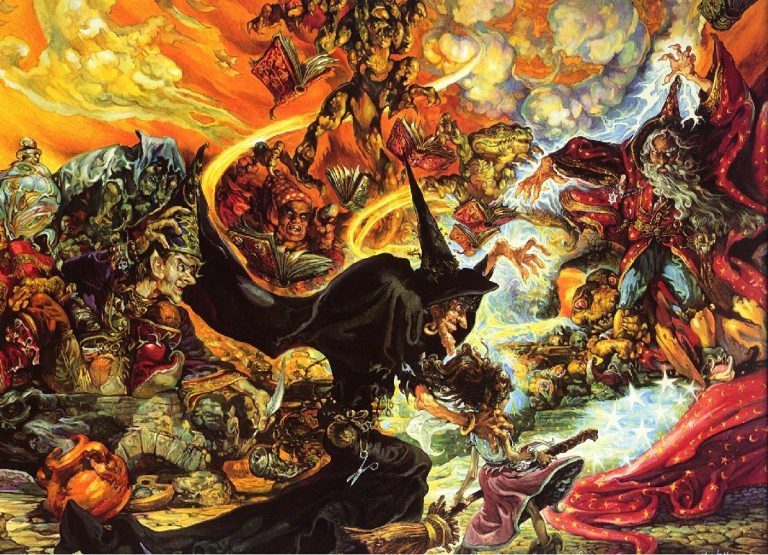‘Equal Rites’ is the third book in the series, and it is a landmark point in the series for several reasons. Where ‘The Colour of Magic’ was the opener and ‘The Light Fantastic’ was a direct sequel, ‘Equal Rites’ moves away from the established characters of Rincewind and Twoflower and into the realm of Esmerelda ‘Granny’ Weatherwax, who is undeniably one of Sir Terry’s finest creations. Granny Weatherwax is a fan favourite and it is hard to imagine now that there was ever a Discworld where she didn’t exist. Granny has been with Sir Terry since this novel’s publication in 1987, and has become so important that the last novel (The Shepherd’s Crown) is even dedicated to her. With that in mind, going back to her conception has been a surprisingly emotional experience. I’m not sure this re-read will ever stop throwing up these little moments of bittersweet realisation.
This book is also the first to spend any real time in Ankh-Morpork, after Rincewind’s travels took him all over the disc and away from his home. We also learn about the Guild of Thieves and, by proxy, the guild system that the people of Ankh-Morpork live and work by. Every worker belongs to a guild and follows their rules, and those who work independently of the guilds are looked on very harshly indeed. To this end, even the thieves of the city are honest and organised, in their own ways. The guilds say a lot about the attitude of the people who live there; if you are going to be robbed, you want to make sure that a professional is doing it, someone you can rely on to get it right. The acceptance of this makes Ankh-Morpork seem quite charming; it isn’t the nicest place to live, but the people are honest and they work hard. Everyone has to earn their keep, after all.
One of the things I noticed during this novel was that Sir Terry never tries to disguise the narrative voice as being anything but his own. There are a lot of metaphors that come up which involve comparisons to things like dodgems and radio, things that do not exist on the disc and therefore cannot be compared by anyone who is not firmly of our own world. I wonder if this is a deliberate move on Sir Terry’s part, claiming Discworld for his own and allowing no one to mistake it as belonging to anyone but him. There is no omniscient third party here, telling the stories. There is only Terry Pratchett and his wacky, wonderful imagination.
In my last article on ‘The Light Fantastic’, I quoted Twoflower – ‘You haven’t really been anywhere until you’ve got back home’ – and I related it to Rincewind and his journey of self-discovery, and how he seems a better person for having been away and come back. That theme seems to continue in this novel, when Arch Chancellor Cutangle and Granny Weatherwax share a tender moment, reminiscing about the old days. Cutangle talks about going home to his village and feeling left out, despite having seen things and learned more than the rest of his family would ever know. He says that maybe, despite it all, wizards ‘shouldn’t go home’. Granny says that they can’t. Rincewind, that perpetually unlucky character, it seems then, is in fact luckier than he appears – the only home he has ever known is with the wizards at the Unseen University, with whom he can at least share the things he knows and be sure that no one will look at him like he is speaking another language. For other wizards and, I would dare to assert, for the witches as well, magic is a decidedly lonely pursuit. Suddenly, the familial vibe that you get from reading about the Unseen University, and the closeness of the witches in later novels, begins to take on a new shape. Family is a theme that Sir Terry often brings up, but for the first time I am seeing how the wizards and witches of the disc could fit into a debate about that very topic – when you can’t go home, you turn instead to those who can understand you.
Favourite Quote:
“…it persisted, arriving in her mind like the unexpected limbo dancer under the lavatory door of life.”
Some of the coverage you find on Cultured Vultures contains affiliate links, which provide us with small commissions based on purchases made from visiting our site. We cover gaming news, movie reviews, wrestling and much more.



